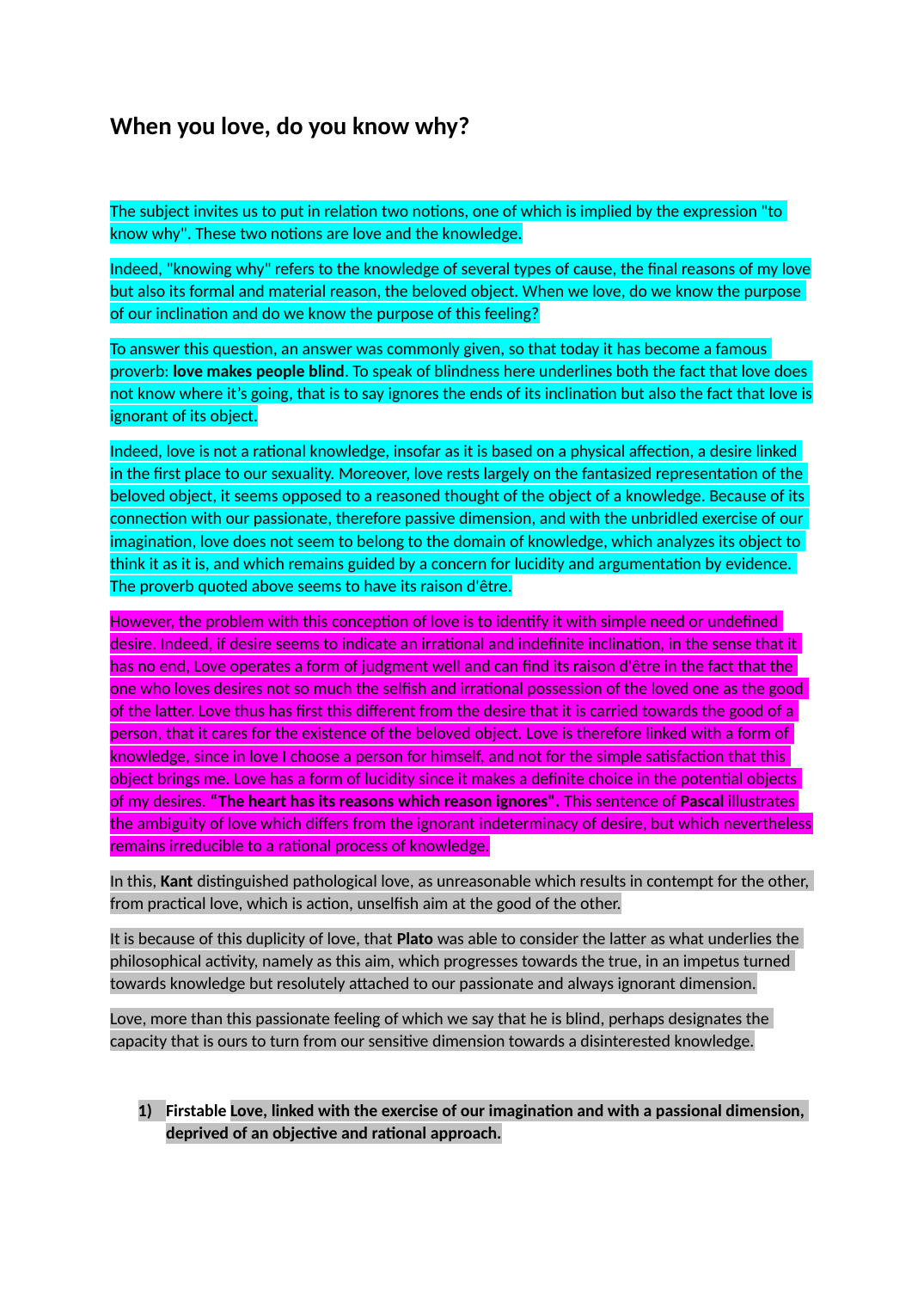When you love you know why?
Publié le 25/02/2021

Extrait du document
«
When you love, do you know why?
The subject invites us to put in relation two notions, one of which is implied by the expression "to
know why".
These two notions are love and the knowledge.
Indeed, "knowing why" refers to the knowledge of several types of cause, the final reasons of my love
but also its formal and material reason, the beloved object.
When we love, do we know the purpose
of our inclination and do we know the purpose of this feeling?
To answer this question, an answer was commonly given, so that today it has become a famous
proverb: love makes people blind .
To speak of blindness here underlines both the fact that love does
not know where it’s going, that is to say ignores the ends of its inclination but also the fact that love is
ignorant of its object.
Indeed, love is not a rational knowledge, insofar as it is based on a physical affection, a desire linked
in the first place to our sexuality.
Moreover, love rests largely on the fantasized representation of the
beloved object, it seems opposed to a reasoned thought of the object of a knowledge.
Because of its
connection with our passionate, therefore passive dimension, and with the unbridled exercise of our
imagination, love does not seem to belong to the domain of knowledge, which analyzes its object to
think it as it is, and which remains guided by a concern for lucidity and argumentation by evidence.
The proverb quoted above seems to have its raison d'être.
However, the problem with this conception of love is to identify it with simple need or undefined
desire.
Indeed, if desire seems to indicate an irrational and indefinite inclination, in the sense that it
has no end, Love operates a form of judgment well and can find its raison d'être in the fact that the
one who loves desires not so much the selfish and irrational possession of the loved one as the good
of the latter.
Love thus has first this different from the desire that it is carried towards the good of a
person, that it cares for the existence of the beloved object.
Love is therefore linked with a form of
knowledge, since in love I choose a person for himself, and not for the simple satisfaction that this
object brings me.
Love has a form of lucidity since it makes a definite choice in the potential objects
of my desires.
“The heart has its reasons which reason ignores".
This sentence of Pascal illustrates
the ambiguity of love which differs from the ignorant indeterminacy of desire, but which nevertheless
remains irreducible to a rational process of knowledge.
In this, Kant distinguished pathological love, as unreasonable which results in contempt for the other,
from practical love, which is action, unselfish aim at the good of the other.
It is because of this duplicity of love, that Plato was able to consider the latter as what underlies the
philosophical activity, namely as this aim, which progresses towards the true, in an impetus turned
towards knowledge but resolutely attached to our passionate and always ignorant dimension.
Love, more than this passionate feeling of which we say that he is blind, perhaps designates the
capacity that is ours to turn from our sensitive dimension towards a disinterested knowledge.
1) Firstable Love, linked with the exercise of our imagination and with a passional dimension,
deprived of an objective and rational approach..
»
↓↓↓ APERÇU DU DOCUMENT ↓↓↓
Liens utiles
- LE DISCOURS D’UN ROIFrançais Anglais In the first instance, i’m going to recapitulate the movie for those of you who don’t know.
- the handmaid's tale: How far do you agree that Margaret Atwood makes resistance central to THT?
- Why men loves ****** intro
- Do you believe that pop culture has made women nudity and body an object ?
- what cause would you be ready to fight for


